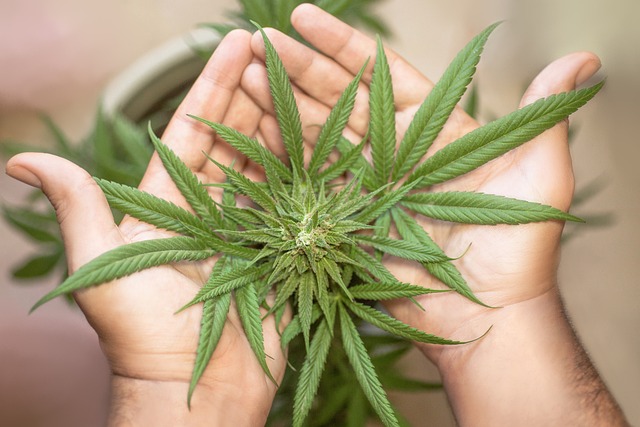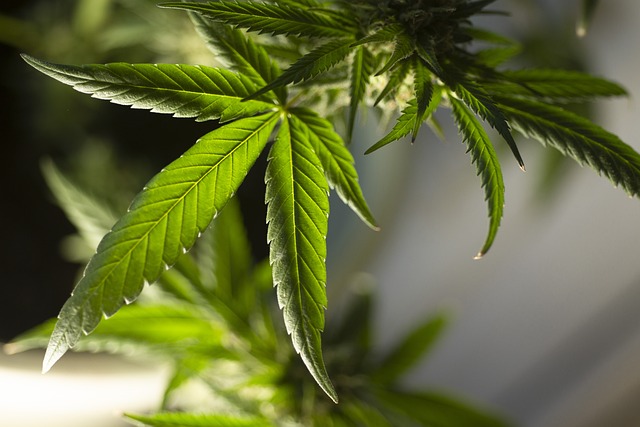2023 marked a significant advancement for Maryland's cannabis market with the introduction of THCA (Tetrahydrocannabinolic Acid) flower, which became legal as part of the state's progressive cannabis regulations. THCA, a non-psychoactive precursor to THC, offers therapeutic benefits and wellness advantages without the traditional 'high.' Maryland's move to allow THCA aligns with its commitment to a responsible cannabis industry, providing consumers with a new experience and spurring interest in its potential health benefits. The state's regulatory framework ensures safety and potency testing for these products. THCA legal in Maryland has opened up opportunities for consumers to explore its benefits, such as anti-inflammatory and analgesic properties, without psychoactive effects. As awareness grows, so does the recognition of THCA's significance in the wellness industry within the state. Users should be mindful of the legal parameters around THCA consumption and individual sensitivities to cannabinoids, with a focus on understanding the potential side effects like mild psychoactivity or gastrointestinal issues that may arise from using THCA flowers, especially after decarboxylation. Consumers in Maryland are encouraged to start with small doses to gauge their personal reaction and use these products responsibly to avoid adverse effects.
Exploring the emergence of THCA flower within Maryland’s regulated cannabis market, this article delves into the science and potential side effects of this non-psychoactive cannabinoid. As THCA becomes increasingly accessible under Maryland’s legal framework, understanding its impact on health is paramount. From respiratory and gastrointestinal effects to psychological changes, we examine the breadth of THCA’s influence on consumers, highlighting safe consumption practices and interaction with other medications or health conditions. Our comprehensive guide covers dosage considerations, managing allergic reactions, and integrating THCA with other cannabinoids for optimal well-being. With expert insights and a look at the evolving regulatory environment, this article provides a balanced overview of THCA’s place in Maryland’s cannabis landscape.
- ThCA Flower and Its Presence in Maryland's Legal Cannabis Market
- Understanding THCA: The Non-Psychoactive Precursor to THC
- Potential Side Effects of THCA Flower Use
ThCA Flower and Its Presence in Maryland's Legal Cannabis Market

2023 has seen a significant shift in the cannabis landscape, particularly with the emergence of THCA (Tetrahydrocannabinolic Acid) flower in Maryland’s legal cannabis market. As one of the first states to decriminalize cannabis in 2021, Maryland has continued to carve a path for responsible and regulated use. The presence of THCA flower, which is the raw form of THC that becomes psychoactive when heated, marks a new era for consumers looking for alternative cannabinoid experiences. THCA legal in Maryland has opened up opportunities for patients and recreational users alike, offering a range of potential benefits from pain relief to mood enhancement, without the immediate psychoactive effects associated with THC. This non-psychoactive form is particularly appealing to those seeking the therapeutic properties of cannabinoids without the ‘high’ experience. As the market adapts to this new addition, consumers in Maryland are exploring the benefits and effects of THCA flower, contributing to the growing body of anecdotal evidence and scientific research on its use. The state’s regulatory framework ensures that these products are tested for safety and potency, providing users with confidence in their choices within the burgeoning cannabis industry.
Understanding THCA: The Non-Psychoactive Precursor to THC

Cannabidiolic acid (THCA) is a non-psychoactive cannabinoid found in raw cannabis plants, which, when heated, converts into the more well-known psychoactive compound tetrahydrocannabinol (THC). THCA’s legal status varies by jurisdiction; in Maryland, it falls within the state’s broader hemp and CBD regulations, making THCA legal in Maryland so long as it is derived from hemp and contains less than 0.3% THC on a dry weight basis. This distinction is crucial for consumers and producers alike, as it opens up a new realm of cannabinoid-based wellness products without the psychoactive effects typically associated with cannabis.
Research into THCA has been growing, with studies suggesting potential therapeutic benefits including anti-inflammatory, neuroprotective, and analgesic properties. These preliminary findings have led to a surge of interest in THCA as a supplement or therapeutic agent for various conditions. In Maryland, where the legal landscape is favorable, consumers have access to THCA-rich products derived from hemp. It’s essential for users to understand the legal nuances and potential effects of THCA, particularly if they are sensitive to or regulated by cannabis regulations due to their employment or other commitments. As interest in cannabinoids continues to expand, THCA’s role in the wellness industry, especially within a state like Maryland where it is legal, is likely to increase, offering an alternative option for those seeking the benefits of cannabinoids without the psychoactive impact.
Potential Side Effects of THCA Flower Use

THCA, or tetrahydrocannabinolic acid, is a non-psychoactive compound found in the Cannabis sativa plant that is precursor to THC, the primary psychoactive element in cannabis. As legislative landscapes evolve, such as in Maryland where THCA products are legal under certain conditions, consumers are increasingly exploring its potential benefits and effects. While THCA is often touted for its therapeutic properties, it’s important to be aware of its potential side effects when used as a flower.
Common reported side effects of THCA flower use include mild psychoactive effects, which can vary depending on the individual’s sensitivity and dosage. Some users may experience dizziness, dry mouth, or mild paranoia, particularly at higher doses. Unlike its psychoactive counterpart THC, THCA typically induces a clear-headed high that is less likely to impair one’s ability to function but can still affect cognition and perception. Additionally, THCA has been reported to cause gastrointestinal issues such as nausea or diarrhea in some users, especially when used in large quantities. It’s also worth noting that the side effects may be more pronounced when THCA is converted to THC through decarboxylation, a process that can occur during storage or heating. Users in Maryland looking to consume THCA flowers should start with small doses to gauge their individual response and proceed with caution, monitoring how their body reacts to avoid any adverse effects.
In light of the recent legalization of cannabis derivatives, including THCA flower, in Maryland, it’s clear that understanding the nuances of this non-psychoactive compound is crucial for consumers. This article has explored the emergence of THCA within the state’s regulated market and shed light on its differences from its psychoactive counterpart, THC. While THCA offers potential therapeutic benefits, it’s important to be aware of its side effects, which can range from mild discomfort to more severe reactions in some individuals. Consumers are encouraged to approach THCA flower with a informed perspective, recognizing the legal status of such products within Maryland and considering personal health implications. As research continues to evolve, staying updated on scientific findings will be key to responsibly enjoying the benefits of THCA while mitigating potential side effects.
